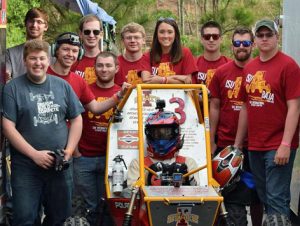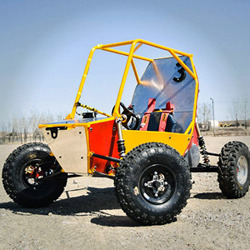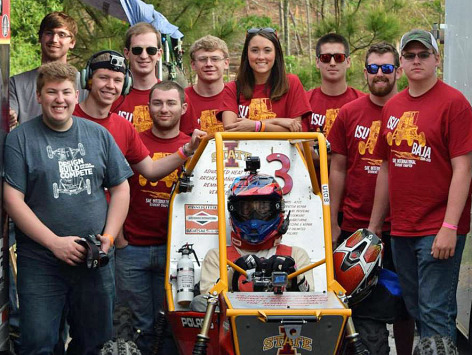It was a Friday afternoon and there was Zach Verbeck in the back of the Cyclone Racing garage, working away on a homemade brake dyno, looking for data that could improve the performance of Iowa State’s mini off-road racer.

The senior from Cedar Falls who’s studying mechanical engineering was taking torque readings in foot-pounds. He hoped the information would help him and the rest of the student-engineers on Iowa State’s Baja SAE Team find just the right combination of brake pads, calipers and rotors.
He was looking for any marginal gains that could turn the team’s early season top 20 finish into a better result.
Last month the team competed in the Baja SAE event in Auburn, Alabama. The annual series of three contests features student-designed and student-built off-road racers. The contests are sponsored by SAE International, formerly the Society of Automotive Engineers.
 In Alabama, Iowa State’s team finished eighth in land maneuverability, 14th in sales presentation, 17th in acceleration, 20th in the hill climb, 25th in suspension and traction, 26th in cost and tied for 30th in design. But, in the premier event – the four-hour endurance race worth 40 percent of a team’s possible score – the team finished 34th. Overall, Cyclone Racing finished 20th of 92 registered teams.
In Alabama, Iowa State’s team finished eighth in land maneuverability, 14th in sales presentation, 17th in acceleration, 20th in the hill climb, 25th in suspension and traction, 26th in cost and tied for 30th in design. But, in the premier event – the four-hour endurance race worth 40 percent of a team’s possible score – the team finished 34th. Overall, Cyclone Racing finished 20th of 92 registered teams.
“In the endurance race, we had a couple of setbacks that were really minor, but they held us back a lot,” said Verbeck, the project director for this year’s Baja team.
First, the lower A-arm of the right-front suspension wasn’t connected properly. It came lose and the team lost 40 minutes for a tow to the pits and repairs. Then, the team was black-flagged when a rock broke through one of the car’s plastic side panels. The team had to hustle back to the pits to quickly tape over the hole.
But, when the repairs were done, the car was good and fast over the course’s mud, rocks and logs. So the race could have been so much better.
“We’re not discouraged,” Verbeck said. “We know we have a good car.”
He explained a couple of this year’s innovations, noting it would take a budget of about $70,000 to build the car and project from scratch:
- The team designed custom, dual-rate suspension springs for all four corners of the car: “We have a lot better suspension handling than last year. We can hit curbs at full speed and barely feel it.”
- The team built a lightweight drivetrain: “We’ve reduced the number of parts in the assembly. We’re trying to make it simple for ease of manufacturing and being able to work on the car.”
- And, the team developed a new system that uses the engine exhaust to pull cooling air through the continuously variable transmission: “In previous years, we’ve had cooling issues with the rubber belt. But now we’ve added the cooling system and are completely sealing the belt in this housing to keep it as clean and cool as possible.”
So, when team members head for their next competition in Portland, Oregon, May 27-30, Verbeck says they’re looking forward to better racing.
“We’re getting geared up for Oregon,” he said. “We expect a lot higher performance for this car. We’re optimistic.”
This story was originally published by Mike Krapfl of the Iowa State News Service.
